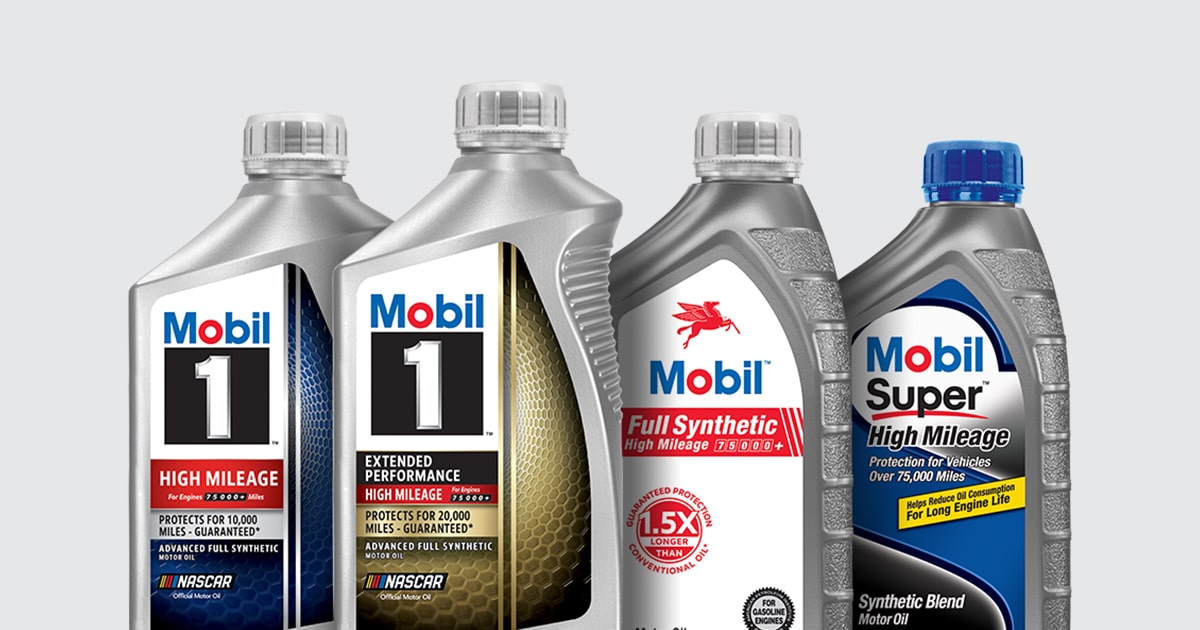Mixing high mileage oil with regular oil is not an issue as long as they are of the appropriate weight as specified by the car manufacturer. There is no danger or risk to the engine, and even mixing high mileage oil with regular synthetic oil is safe.
However, the American Automobile Association (AAA) advises against long-term use of a mixture of synthetic and regular oil. Despite some loss of benefits from the high mileage oil, it is possible to mix it with conventional or synthetic oil if necessary.
However, it is important to follow the specifications in the owner’s manual for new vehicles. High mileage oils offer higher viscosities and film strengths to reduce the risk of metal-to-metal contact compared to regular oil.

Credit: blog.amsoil.com
Understanding The Compatibility Of High Mileage And Regular Oil
When it comes to maintaining the health of our vehicles, choosing the right oil is crucial. With various options available, it is common to wonder if it is possible to mix high mileage oil with regular oil. In this section, we will explore the compatibility of high mileage and regular oil, helping you make an informed decision for your car’s engine.
Exploring The Differences Between High Mileage Oil And Regular Oil
Before delving into the compatibility aspect, it is essential to understand the fundamental differences between high mileage oil and regular oil. High mileage oil is specifically designed for vehicles with over 75,000 miles, formulated to address the unique needs of aging engines. It contains specialized additives that help reduce oil consumption, minimize leaks, and prevent the formation of sludge and deposits.
On the other hand, regular oil, also known as conventional motor oil, is suitable for vehicles with lower mileage and newer engines. It is formulated to meet the basic requirements of engine lubrication and protection.
Breaking Down The Composition And Properties Of Each Type
The composition and properties of high mileage and regular oil differ slightly, affecting their performance in engines. Here’s a breakdown of what makes each type unique:
| Type of Oil | Main Composition | Key Properties |
|---|---|---|
| High Mileage Oil | Base oil, detergents, seal conditioners, and antioxidants. | Reduced oil consumption, seal protection, minimized sludge formation, and enhanced deposit prevention. |
| Regular Oil | Base oil and additives. | Basic engine lubrication, wear protection, and temperature regulation. |
Understanding The Importance Of Oil Weight And Viscosity
When it comes to mixing high mileage oil with regular oil, it is crucial to consider the oil weight and viscosity. These factors determine the oil’s ability to flow and lubricate engine parts effectively. Each vehicle manufacturer specifies the recommended oil weight and viscosity for optimal engine performance.
It is essential to note that mixing high mileage oil with regular oil of the appropriate weight, as recommended by your car manufacturer, is generally safe. Regardless of whether they are of the same brand or not, there are usually no issues with combining high mileage-rated and regular full synthetic oils.
However, it is important to keep in mind that while mixing the two types of oil won’t harm your engine, it may affect the performance and benefits associated with high mileage oil. The specialized additives in high mileage oil may not be as effective when diluted with regular oil.
Therefore, if you choose to mix high mileage oil with regular oil, it is advisable to do so only occasionally or as a temporary solution. For long-term engine health and maximum benefits, it is recommended to stick to using one type of oil consistently.
Now that you have a better understanding of the compatibility between high mileage and regular oil, you can make an informed decision based on your vehicle’s needs and manufacturer recommendations. Remember, regular oil changes using the appropriate oil type and adhering to the recommended intervals are vital for maintaining the longevity and performance of your engine.
The Benefits Of Mixing High Mileage And Regular Oil
Mixing high mileage oil with regular oil is completely safe as long as the oils have the same weight and brand. There is no risk of engine damage, and it won’t affect your engine’s performance. However, it’s not recommended as a long-term solution according to AAA.
need to consider the benefits and potential effects of mixing high mileage oil with regular oil. In this section, we will explore the advantages of this combination and how it can optimize your engine performance, fuel efficiency, and lubrication.Maximizing Engine Performance And Lifespan
Mixing high mileage oil with regular oil can be beneficial in maximizing engine performance and extending its lifespan. High mileage oil is specifically formulated to address the issues commonly experienced by older engines, such as increased wear, friction, and oil consumption. Its unique additives work to rejuvenate seals and gaskets, reduce leaks, and protect against engine sludge buildup, leading to smoother operation and improved overall performance. By combining high mileage oil with regular oil, you can enjoy the benefits of both. Regular oil provides excellent lubrication properties and cleanliness to protect your engine, while the high mileage oil’s specialized additives target the specific needs of older engines. This combination helps to minimize wear, reduce engine noise, and maintain optimal engine performance, ensuring a longer and more efficient life for your vehicle.Improving Fuel Efficiency And Reducing Emissions
In addition to optimizing engine performance, mixing high mileage oil with regular oil can also improve fuel efficiency and reduce emissions. As engines age, they may experience increased friction and wear, which can lead to decreased fuel economy. High mileage oil contains additives that reduce friction and improve fuel efficiency by providing a smoother lubrication film between moving engine components. Regular oil, on the other hand, helps to keep the engine clean, minimizing carbon buildup and deposits that can negatively impact fuel combustion. By combining high mileage oil with regular oil, you can benefit from reduced friction and increased cleanliness, resulting in improved fuel efficiency and reduced emissions.Enhancing Lubrication And Reducing Friction
One of the key advantages of mixing high mileage oil with regular oil is enhanced lubrication and reduced friction. High mileage oil is formulated with additives such as detergents, dispersants, and anti-wear agents that provide superior lubrication and reduce friction between moving engine parts. These additives help to protect against wear and tear, especially in older engines that may have worn seals or gaskets. Regular oil, on the other hand, offers excellent lubrication properties to keep the engine running smoothly. By combining high mileage oil with regular oil, you can ensure comprehensive protection against friction and wear. The specialized additives in high mileage oil complement the lubrication properties of regular oil, resulting in reduced friction, less engine noise, and increased overall efficiency. In summary, mixing high mileage oil with regular oil provides several benefits for your engine. It helps to maximize engine performance and lifespan, improve fuel efficiency, and reduce emissions. Additionally, this combination enhances lubrication and reduces friction, ensuring smoother engine operation and minimal wear and tear. By understanding the advantages of mixing these oils, you can make an informed decision to optimize your engine’s performance and keep your vehicle running smoothly for longer.Proper Techniques For Mixing High Mileage And Regular Oil
When it comes to maintaining the health and longevity of your engine, choosing the right oil is paramount. But what if you find yourself in a situation where you need to mix high mileage oil with regular oil? Is it safe? Are there any precautions you need to take? In this article, we will delve into the proper techniques for mixing high mileage and regular oil to ensure optimal performance and protection for your engine.
Checking The Oil Weight And Compatibility
Before you dive into mixing different types of oil, it is crucial to check the weight and compatibility of the oils you plan to mix. The weight of the oil, often expressed as 5W-30 or 10W-40, indicates its viscosity and its ability to flow smoothly at different temperatures. Different car manufacturers recommend specific oil weights for their engines, and it’s crucial to adhere to these recommendations to prevent any potential damage.
In addition to checking the oil weight, it’s important to ensure that the high mileage oil and regular oil you are planning to mix are compatible. While most oils are compatible with each other, there can be variations in additive packages. Mixing oils of the same brand can alleviate concerns about compatibility, but it’s still essential to verify this information before proceeding.
Gradually Introducing High Mileage Oil To Regular Oil
Once you have determined the compatibility and checked the weights of the oils, it is recommended to gradually introduce the high mileage oil to the regular oil. This gradual approach helps the engine adapt and minimize any potential adverse effects.
Start by replacing a small percentage, such as 10-20%, of the regular oil with the high mileage oil during the next oil change. Monitor the performance of your vehicle and observe any changes in oil consumption or engine noise. Gradually increasing the percentage of high mileage oil over several oil changes allows the engine to acclimate to the new oil mixture.
Keep in mind that if you mix oils of different viscosities, it may alter the overall viscosity of the oil blend. If the viscosity changes significantly, it is advisable to consult your car manufacturer or a trusted mechanic to ensure it aligns with the requirements of your specific engine.
Understanding The Appropriate Ratios For Mixing
When mixing high mileage and regular oil, understanding and maintaining the proper ratios is crucial for optimal engine performance. It’s recommended to follow the guidelines provided by the oil manufacturer or consult your vehicle’s owner manual for specific recommendations.
In general, the ratio of high mileage oil to regular oil should not exceed a 50:50 mix. This ensures that the vehicle receives the benefits of both oils while minimizing the risks associated with incompatible additives or viscosity differences.
Remember, it’s always better to err on the side of caution and consult professionals if you are unsure about the appropriate ratios for your particular engine.
In conclusion, when mixing high mileage oil with regular oil, it is important to check the oil weight and compatibility, gradually introduce the high mileage oil to the regular oil, and understand the appropriate ratios for mixing. Following these proper techniques ensures that your engine receives the optimal blend of oils, protecting its performance and longevity.
Common Misconceptions And Safety Concerns
Mixing high mileage oil with regular oil is not a problem as long as the weight of the oil is appropriate for your car. There is no danger or risk of damaging your engine, and if the oils are from the same brand, it is even less of a concern.
However, it is not recommended as a long-term solution according to the American Automobile Association (AAA).
Common Misconceptions and Safety Concerns Debunking the myth of oil combustion and engine damage It’s not uncommon for car owners to have concerns when it comes to mixing different types of oil. One common misconception is that mixing high mileage oil with regular oil can lead to oil combustion and engine damage. However, this is far from the truth. There is no danger or risk of combustion when mixing high mileage oil with regular oil. The two types of oil are compatible and can be used together without causing any harm to your engine. It’s important to understand that both high mileage oil and regular oil serve the same purpose – to lubricate and protect your engine. Addressing potential risks and side effects While it’s safe to mix high mileage oil with regular oil, there are some potential risks and side effects that you should be aware of. One concern is that mixing different types of oil may affect the performance of the additives in each oil. For example, high mileage oil typically contains more anti-wear additives compared to regular oil. Mixing the two oils might dilute or alter the effectiveness of these additives. In addition, mixing oils of different viscosities can also affect the overall viscosity of the blended oil. This can impact the flow properties and lubrication capabilities of the oil, which may not provide optimal protection for your engine. It’s important to keep in mind that viscosity requirements can vary depending on your car’s specific make and model. Always refer to your car manufacturer’s recommendations to ensure you’re using the appropriate oil viscosity. Highlighting recommendations from experts and car manufacturers Experts and car manufacturers generally recommend using the same type and brand of oil to ensure optimal performance and protection for your engine. While mixing high mileage oil with regular oil is generally safe, it’s not considered a long-term solution. If you find yourself in a pinch and need to top off your oil, mixing the two types of oil shouldn’t cause any immediate harm. However, it’s recommended to eventually drain and replace the blended oil with the appropriate oil for your car. In conclusion, it’s important to understand that mixing high mileage oil with regular oil is generally safe, but not ideal for long-term use. While there is no danger of oil combustion or engine damage, there are potential risks and side effects to consider. It’s always best to follow the recommendations of experts and car manufacturers, using the appropriate oil type and viscosity for your specific vehicle.Best Practices For Mixing High Mileage And Regular Oil
When it comes to maintaining the health and performance of your vehicle, using the right oil is crucial. In some cases, you may find yourself in a situation where you need to mix high mileage oil with regular oil. While this is generally safe, it’s important to follow specific guidelines to ensure optimal results. Here are the best practices to keep in mind:
Following Specific Guidelines From The Vehicle’s Manufacturer
Before mixing high mileage oil with regular oil, it’s essential to check the recommendations provided by your vehicle’s manufacturer. They typically specify the recommended oil weight and type for your particular engine. By adhering to their guidelines, you can ensure that you’re using the right combination of oils for your vehicle’s specific needs. The manufacturer’s guidelines should always take precedence when it comes to oil selection and mixing.
Seeking Professional Advice From Mechanics Or Oil Specialists
If you’re unsure about mixing high mileage oil with regular oil, it’s best to consult with a professional mechanic or oil specialist. They have the expertise and knowledge to assess your vehicle’s requirements and provide tailored recommendations. A professional can evaluate factors such as your engine’s condition, mileage, and overall performance to guide you towards the best oil mixture. Seeking professional advice helps you make informed decisions and avoid any potential risks or adverse effects.
Regularly Monitoring And Maintaining Oil Levels And Quality
Once you’ve mixed high mileage oil with regular oil, it’s crucial to regularly monitor and maintain the oil levels and quality in your vehicle. Regularly checking the oil level ensures that it remains within the recommended range. Additionally, keep an eye on oil color and consistency to detect any abnormalities that may indicate potential issues. If you notice any significant changes, such as oil discoloration or a decrease in oil level, it’s important to address them promptly. Regular oil changes, as recommended by your vehicle’s manufacturer, are also essential to maintain optimal engine health.
In conclusion, mixing high mileage oil with regular oil is generally safe, as long as you follow specific guidelines from the vehicle’s manufacturer, seek professional advice, and regularly monitor and maintain your oil levels and quality. By adhering to these best practices, you can ensure that your engine receives the appropriate care and performance it needs.
Frequently Asked Questions On Mixing High Mileage Oil With Regular Oil
Is It Ok To Mix High Mileage Oil With Regular Oil?
Mixing high mileage oil with regular oil is completely fine as long as the oil weight is appropriate for your car as specified by the manufacturer. There is no harm in mixing high mileage oil with regular full synthetic oils, especially if they are from the same brand.
Mixing the two types of oil won’t damage your engine. However, it’s important to note that it is not recommended as a long-term solution. The American Automobile Association (AAA) advises against it.
Can You Use High Mileage Oil In Any Engine?
Yes, you can use high mileage oil in any engine as long as the weight is appropriate for your car manufacturer’s recommendations. Mixing high mileage oil with regular oil poses no issues or harm to your engine, especially if they are the same brand.
Can You Mix Synthetic Oil With High Mileage Synthetic?
Yes, you can mix synthetic oil with high mileage synthetic oil as long as they are of the appropriate weight as specified by your car manufacturer. There are no issues or harm to your engine when mixing these oils, especially if they are from the same brand.
Is There A Difference Between High Mileage Oil And Regular Oil?
High mileage oil has higher viscosities and additional additives compared to regular oil. This helps reduce metal-to-metal contact and provides better protection for older engines with higher mileage. Mixing high mileage oil with regular oil is generally safe as long as they have the same weight and brand.
Conclusion
Mixing high mileage oil with regular oil is generally safe as long as they have the same weight and are from the same brand. While there may be slightly more anti-wear additives in high mileage oil, the difference is minimal.
However, it is not recommended as a long-term solution by the AAA. It’s important to follow the recommendations of your car manufacturer and consult the owner’s manual for the best results. Ultimately, using high mileage oil in a new vehicle is not advised as it may not provide the full benefits.


Leave a Reply